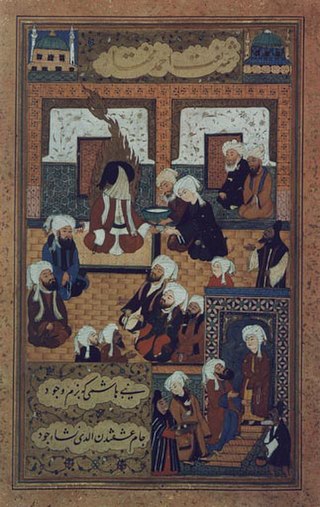
The Companions of the Prophet were the disciples and followers of Muhammad who saw or met him during his lifetime, while being a Muslim and were physically in his presence.
ʿAbd Allāh ibn ʿAbbās, also known as Ibn ʿAbbās, was one of the cousins of the prophet Muhammad. He is considered to be the greatest mufassir of the Qur'an.
The tābiʿūn, "followers" or "successors", are the generation of Muslims who followed the companions (ṣaḥāba) of the Islamic prophet Muhammad, and thus received their teachings secondhand. A tābiʿ knew at least one ṣaḥābī. As such, they played an important part in the development of Islamic thought and knowledge, and in the political development of the early caliphate.
Lubaynah was a former slave woman in Arabia, who embraced Islam and was one of the disciples (Sahaba) of the Islamic prophet Muhammad. She was one of the slaves freed by Abu Bakr.
Nāfiʿ ibn al-Ḥārith ibn Kalada al-Thaqafī ) was an Arab physician of the Banu Thaqif. He was recommended by Muhammad, and treated Sa'd ibn Abi Waqqas and Abu Bakr. When the latter was dying, he designated his illness as poisoning.
Abu Dharr Al-Ghifari Al-Kinani, also spelled Abu Tharr or Abu Zar, born Jundab ibn Junādah, was the fourth or fifth person converting to Islam, and a member of the Muhajirun. He belonged to the Banu Ghifar, the Kinanah tribe. His date of birth is unknown. He died in 652 CE, at Al-Rabadha, in the desert east of Medina.
Wahshi ibn Harb, also known as Abu Dusmah was a former slave of Jubayr ibn Mut'im before becoming a freedman and a Sahabi. He is best known for killing a leading Muslim fighter, Hamza ibn ‘Abd al-Muttalib, Muhammad's uncle, prior to converting to Islam, and afterwards reportedly killing Musaylimah, the leader of an enemy apostate army waging war against the Muslims.
As-Samaw’al bin ‘Ādiyā’ was a pre-Islamic Arabian poet and warrior, esteemed by the Arabs for his loyalty, which was commemorated by an Arabic idiom: "awfá min as-Samaw’al".
Wahb ibn Munabbih was a Yemenite Muslim traditionist of Dhimar in Yemen. He was a member of Banu Alahrar, a Yemeni of Persian origin.
Abdallah ibn Salam, born Al-Husayn ibn Salam, was a companion of the Islamic prophet Muhammad, and a Jew who converted to Islam. He participated in the conquest of Syria, but died in Medina.

Israʼiliyyat are narratives assumed to be of foreign import in many parts of modern Islamic scholarship. Isra'iliyyat are typically said to derive from Jewish sources, but some also sourced from Christian or Zoroastrian tradition. Many Muslim scholars now label Isra'iliyyat as un-Islamic or foreign to Islam, yet they were enthusiastically used by pre-modern scholars.
Hammam ibn Munabbih was an Islamic scholar, from among the Tabi‘in and one of the narrators of hadith.

Ṣaḥīfat Hammām ibn Munabbih, lit. 'The Book of Hammam ibn Munabbih', is a hadith collection compiled by the Yemeni Islamic scholar Hammam ibn Munabbih. It is sometimes quoted as one of the earliest surviving works of its kind.
Khuzayma ibn Thabit Dhu al-Shahadatayn al-Ansari was one of the companions of the Islamic prophet, Muhammad.
Abū Maymūn Jābān al-Kurdī, also referred to as Jaban Sahabi, was a reputed companion of the Islamic prophet Muhammad. Jābān was of Kurdish ethnicity.
Abū ʿAbd Allāh Shuraḥbīl ibn Ḥasana was one of the earliest Muslim converts, sahaba and a key commander in the Rashidun army during the Muslim conquest of the Levant.
Abd Allah ibn Amr ibn al-As was the son of Amr ibn al-As of Banu Sahm and was a companion of the Islamic prophet Muhammad. He was the author of "Al-Sahifah al-Sadiqah", the first known hadith compilation document. The document contained about one thousand of Muhammad's narrations.
Zinira al-Rumiya, was a woman in Arabia, an early convert to Islam and one of the disciples (Sahaba) of the Islamic prophet Muhammad. She was among the slaves freed by Abu Bakr.
Madhḥaj is a large Qahtanite Arab tribal confederation. It is located in south and central Arabia. This confederation participated in the early Muslim conquests and was a major factor in the conquest of the Persian empire and the Roman empire.

